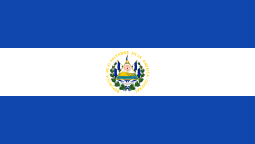Salvadoran Canadians
| Canadiense-Salvadoreña | |
|---|---|
  | |
| Total population | |
|
By birth: 43,655 By ancestry: 63,965 (0.2%)[1] | |
| Regions with significant populations | |
|
| |
| 28,765 (0.23%) | |
| 16,635 (0.22%) | |
| 7,565 (0.17%) | |
| 6,900 (0.19%) | |
| 3,125 (0.27%) | |
| Languages | |
| English, French, Spanish. | |
| Religion | |
| Roman Catholicism, Protestantism | |
| Related ethnic groups | |
| Salvadoran people, Mestizo, Spanish people, Latin, Native Americans. | |
Salvadoran Canadians (French: Salvadoriens canadiens; Spanish: Salvadoreño canadiense) are Canadian citizens who have ancestry from El Salvador, a Central American country. Per the National Household Survey in 2011, 63,965 Canadians indicated that they were of full or partial Salvadoran ancestry (0.2% of the country's population).[1]
History
Salvadoran immigration to Canada is a fairly recent phenomenon. Until the 1980s, Salvadoran immigration to Canada was small to nonexistent. It wasn't until the civil war did sizable numbers of Salvadorans started to come to the country. Between 1982 and 1987, 11,251 Salvadorans entered Canada under a special program that help displaced Salvadorans as well as Guatemalans suffering from the war.[2] A lot like their Australian counterparts, some of these were political asylum seekers and others were refugees looking for a place to stay. Unlike their American counterparts, Salvadorans seeking refuge in Canada were more likely to have their asylum applications approved than those in the United States; as a result of different Canadian and American policy to the situation in El Salvador.[3] In 2002, immigrants from El Salvador came to Brandon, Manitoba to work for a food processing company.[4][5]
Demographics
The province with the highest concentration of people of Salvadoran ancestry is Manitoba, which is 0.3% Salvadoran Canadian. The province with highest number of people with Salvadoran ancestry is Ontario, with 29,000 Salvadorean Canadians.[1] The cities in Canada with the highest concentration of Salvadoran Canadians are: Brandon, Manitoba (2.3%), Kitchener, Ontario (1.1%), Montreal, Quebec (0.7%), London, Ontario (0.7%), New Westminster, British Columbia (0.7%), Toronto, Ontario (0.4%), Edmonton, Alberta (0.4%), Brampton, Ontario (0.4%), Burnaby, British Columbia (0.4%), Vancouver, British Columbia (0.3%), Ottawa, Ontario (0.3%), and Winnipeg, Manitoba (0.3%).[1] Salvadoreans are the third largest Hispanic Population in Canada. In Toronto, many Salvadoran people are located around Eglinton Avenue and Keele Street, and along Jane Street.
References
- 1 2 3 4 , National Household Survey (NHS) Profile, 2011
- ↑ Garcia, Maria Cristina. "Canada: A Northern Refuge for Central Americans". Migration Policy Institute. Retrieved 29 June 2015.
- ↑ Martin, Douglas. "Salvadorans Find a Haven in Canada". The New York Times. Retrieved 29 June 2015.
- ↑ "SALVADORIAN WORKERS CELEBRATE ONE YEAR ANNIVERSARY AT BRANDON FACILITY". December 4, 2003. Retrieved August 1, 2013.
- ↑ "Part 3: Manitoba welcome host for guest workers in Canada". November 3, 2009. Retrieved August 1, 2013.